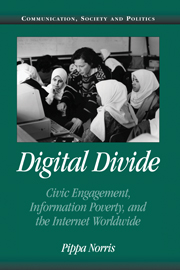Book contents
- Frontmatter
- Contents
- List of Tables
- List of Figures
- Preface
- PART I INTRODUCTORY FRAMEWORK
- PART II THE VIRTUAL POLITICAL SYSTEM
- 5 Theories of Digital Democracy
- 6 e-Governance
- 7 Online Parliaments
- 8 Virtual Parties
- 9 Civic Society
- PART III THE DEMOCRATIC DIVIDE
- Appendix A Nations in the Study and Abbreviated Names Used in Figures
- Notes
- Select Bibliography
- Index
7 - Online Parliaments
Published online by Cambridge University Press: 05 June 2012
- Frontmatter
- Contents
- List of Tables
- List of Figures
- Preface
- PART I INTRODUCTORY FRAMEWORK
- PART II THE VIRTUAL POLITICAL SYSTEM
- 5 Theories of Digital Democracy
- 6 e-Governance
- 7 Online Parliaments
- 8 Virtual Parties
- 9 Civic Society
- PART III THE DEMOCRATIC DIVIDE
- Appendix A Nations in the Study and Abbreviated Names Used in Figures
- Notes
- Select Bibliography
- Index
Summary
Government department and official agencies may have adjusted conservatively to digital politics but, given the electoral incentives to maintain stronger links with citizens, have elected bodies adapted at a faster rate? To map the virtual political system around the globe, and to understand the democratic potential of digital technologies for national legislatures, this chapter focuses on three questions:
Which national parliaments are currently online?
What is the function of parliamentary websites; in particular how do they provide opportunities for comprehensive information to allow public scrutiny of their activities and interactive communications to facilitate public feedback?
To explain the pattern we establish, how far does the process of democratization, technological diffusion, or socioeconomic development drive variations in the quality of parliamentary websites?
WHICH PARLIAMENTS ARE ONLINE?
Potentially, digital technologies can affect the internal workings of legislatures in multiple ways, from the widespread use of computers for administrative, research, and communication functions by elected members and officials to electronic voting in the chamber. Electronic databases maintained by parliamentary library services, such as Thomas in the U.S. Congress, facilitate more effective and targeted research by members, lobbyists, and policy analysts. Email is likely to have important consequences once it is more widely used by representatives to connect to constituents, with the capacity of replacing or supplementing conventional channels of correspondence and local newsletters, although studies show that many members have problems in responding to quantities of electronic mail.
- Type
- Chapter
- Information
- Digital DivideCivic Engagement, Information Poverty, and the Internet Worldwide, pp. 132 - 147Publisher: Cambridge University PressPrint publication year: 2001

